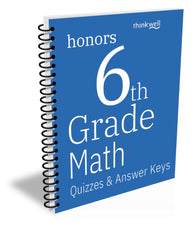Honors 6th Grade Math Online Course
$169.00
Thinkwell's Honors 6th Grade Math with Professor Edward Burger
Buy now, start anytime.
Start anywhere, go as fast as you like.
Are you ready? Free placement test.
Got an advanced student looking for a bit more challenge? This is the Honors version of our award-winning, video-based Grade 6 Math course featuring Professor Edward Burger.
With more than 270 engaging video lessons, Thinkwell's grade 6 math course will give your student the strong, foundational math skills they need to succeed in middle school mathematics. No textbooks required—our course includes fully online exercises, practice problems, and all the tools your student needs to succeed right at their fingertips. For added convenience, optional printed Companion Books are available to support offline study. Preview the e-book here.
The standard version of this course is available here, and here's a comparison of the two courses. You can read reviews of our math courses here.












